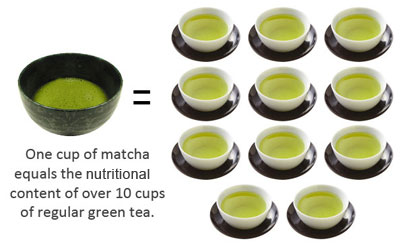
Matcha Health Benefits
A single cup of matcha tea contains the same nutritional benefits found in 10 cups of regular green tea. That’s just one reason why matcha is considered such a healthy beverage. High-quality Japanese matcha is a uniquely rich source of green tea’s powerful antioxidants.
The way the leaves for matcha are grown, harvested and processed determines matcha’s quality and nutrient content.
Young matcha tea leaves are shaded prior to harvest then carefully hand-picked, lightly steamed, air dried, de-stemmed and finally slowly ground into an ultra-fine powder. These methods are used when creating the best matcha tea, however not all matcha tea producers go to this extent, or take this kind of care. At My Matcha Life® this is a must. We would not consider providing any matcha that did not adhere to these methods.
This labor-intense process is the difference between high grade Japanese matcha and lower quality versions.
Matcha Health Benefits
Matcha tea’s concentrated powder contains the entire tea leaf, minus veins and stems. It also contains more antioxidants than any other type of green tea. Catechins are the most famous green tea nutrient.
Because matcha contains the entire tea leaf, matcha drinkers ingest its nutrients in a naturally healthy whole-food form.
L-theanine is an amino acid unique to tea and uniquely abundant in matcha tea. This amino acid makes the tea leaf taste smooth. The higher the l-theanine the smoother tasting the tea. Japanese monks used to drink matcha tea as it helped them to be mentally clear and focused during meditation. As a bonus, matcha’s natural caffeine works in harmony with this amazing amino acid to create a sense of calm alertness without the caffeine jitters.
 |
Caffeine in matcha is similar to the caffeine in coffee but there’s less of it. Matcha contains about half the caffeine coffee does. Not surprisingly, its effects are noticeably less intense.
Order your My Matcha Life® favorites today!